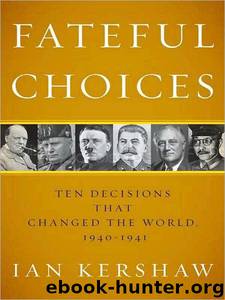Fateful Choices by Ian Kershaw

Author:Ian Kershaw
Language: eng
Format: mobi
Tags: Non-fiction, Modern - 20th Century, World War II, World, 20th Century, Modern, Holocaust, 1939-1945, 1939-1945 - Causes, General, 1939-1945 - Diplomatic History, Military, World War, War, History
ISBN: 9781101202371
Publisher: Penguin Group (USA)
Published: 2006-01-01T00:00:00+00:00
8
Tokyo, Autumn 1941
Japan Decides to Go to War
If we miss the present opportunity to go to war, we will have to submit to American dictation. Therefore, I recognize that it is inevitable that we must decide to start a war against the United States.
Hara Yoshimichi, President of the Privy Council,
5 November 1941
Two years from now we will have no petroleum for military use. Ships will stop moving. When I think about the strengthening of American defences in the south-west Pacific, the expansion of the American fleet, the unfinished China Incident, and so on, I see no end to difficulties. We can talk about austerity and suffering, but can our people endure such a life for a long time?
Tojo Hideki, Japanese Prime Minister, 5 November 1941
In the summer of 1941, Japan’s leaders suddenly faced new options. These were framed, as they had been the previous year, by the immediate global consequences of events far away. As earlier, Hitler had made the decisive move. The German invasion of the Soviet Union on 22 June 1941, like the victory over France almost exactly a year earlier, caught Japan’s power-elite unawares, in spite of the clear warnings they had been given. Hitler’s attack destroyed at one stroke Japanese hopes of building a coalition of forces together with Germany, Italy and the Soviet Union aimed at deterring the western powers from hostilities in the Far East against Japan while she was establishing her dominance of a ‘Greater East Asia Co-Prosperity Sphere’. The driving force behind such a strategy had been the Foreign Minister, Matsuoka Yosuke, who in April, following visits to Berlin and Rome, had engineered a spectacular diplomatic success with the signing of the Japanese-Soviet Neutrality Pact in Moscow. That strategy was now in ruins. Instead, the prospect loomed of the Soviet Union compelled, despite ideological differences, to turn towards Britain and America for support in the clash with Nazi Germany. Japan was set to become more diplomatically isolated than ever. And she still had found no exit route from the China quagmire.
Japan’s leaders differed sharply in how they judged the opportunities and the dangers that had emerged. But overnight, it was clear, the question of an alternative strategy had arisen. Should Japan postpone, at least temporarily, the policy of expansion to the south, determined the previous summer, in favour of a northern advance to strike at the Soviet Union from the east while the Stalinist regime was reeling from the devastating German assault from the west? Much seemed to speak in favour of grasping the chance that had presented itself. There were powerful advocates of such a drastic reordering of priorities, the most outspoken of them Matsuoka himself. In typically ebullient fashion, he simply cast off the strategy that he had been urging for months. ‘Great men will change their minds,’ he declared. ‘Previously I advocated going south, but now I favour the north.’1
Some in the army leadership, too, relished the prospect of landing a fatal blow on the traditional enemy to the north.
Download
This site does not store any files on its server. We only index and link to content provided by other sites. Please contact the content providers to delete copyright contents if any and email us, we'll remove relevant links or contents immediately.
| Africa | Americas |
| Arctic & Antarctica | Asia |
| Australia & Oceania | Europe |
| Middle East | Russia |
| United States | World |
| Ancient Civilizations | Military |
| Historical Study & Educational Resources |
The Ratline by Philippe Sands(1580)
The Holocaust: A New History by Laurence Rees(1529)
The Diary of a Young Girl: The Definitive Edition by Anne Frank; Otto Frank; Mirjam Pressler(1331)
Anne Frank: The Diary of a Young Girl by Anne Frank(1277)
The diary of a young girl: the definitive edition by Anne Frank; Otto Frank; Mirjam Pressler(1244)
Eichmann in Jerusalem by Hannah Arendt(1169)
The Diary of a Young Girl by Frank Ann(1147)
Yes to Life by Viktor E. Frankl(1066)
The New York Times Complete World War II: The Coverage of the Entire Conflict by The New York Times(1013)
Schindler's List by Keneally Thomas(983)
Frank, Anne - The Diary of Anne Frank by Frank Anne(932)
Clara's War by Clara Kramer(921)
Mengele by David G. Marwell(854)
And the Sea Is Never Full by Elie Wiesel(838)
The Pink Triangle: The Nazi War Against Homosexuals by Plant Richard(832)
My Grandfather Would Have Shot Me by Jennifer Teege(820)
The Master Plan by Heather Pringle(809)
All Rivers Run to the Sea: Memoirs by Elie Wiesel(800)
Return to the Reich by Eric Lichtblau(775)
